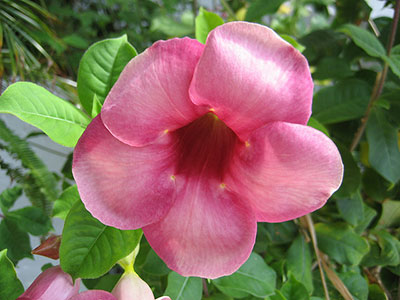Mandevilla

Elevate color in your landscape this summer by growing a mandevilla vine up a trellis, pergola, or arbor, or even over a mailbox.
Characteristics
While other plants melt in Florida’s hot summers, mandevilla (Mandevilla spp.) is a tropical vine that almost seems to smile at the heat, putting out colorful trumpet-shaped blooms along its woody, twining stems.
One of the most recognized varieties is ‘Alice Dupont’, which produces medium pink flowers up to four inches wide and two inches long. Other varieties are available that produce flowers in red or various shades of pink. The white-blooming Mandevilla boliviensis is a favorite of many gardeners. A few yellow flowering vines are often called yellow mandevilla, though they’re technically different plants (Urichtes lutea or Pentilinon luteum).
The stems of larger varieties like ‘Red Velvet’ can reach up to twenty feet long in a single season and are great for growing up trellises and arbors. The more compact cultivars like Sun Parasol® ‘Burgundy’ are well suited for growing over a mailbox. They’re also stunning in hanging baskets or containers as their stems creep over the edges.
Planting and Care
Mandevilla needs to be planted in full sun in order to flower well. It will tolerate a range of soils, as long as the soil is well drained. Mandevilla needs to be watered and fertilized regularly.
You can pinch back tips of new shoots to promote bushier growth. When pruning, watch out for the milky sap since it can irritate skin and may be toxic if ingested.
These vines are evergreen in tropical areas but will die back if exposed to freezing temperatures. Because of this, gardeners in colder parts of Florida might want to grow mandevilla in containers that can be brought inside during winter. Another option is to plant it in the ground and treat it as an annual, since it’s widely available and generally not expensive.
These plants have no serious disease or insect problems, but they’re occasionally bothered by scale and mealybugs. Use an insecticidal soap if needed to treat these pests.
For more information on mandevilla, contact your county Extension office.
UF/IFAS Publications
- Mandevilla splendens ‘Alice Dupont’
- Mandevilla splendens Pink Allamanda
- Mandevilla sanderi ‘Red Riding Hood’
